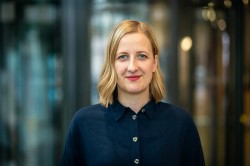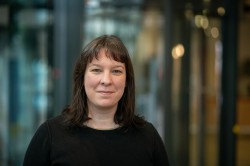Press Release, 24. June 2024
Three grants awarded to the UFZ
The DFG is providing three outstanding UFZ researchers with funding to set up junior research groups
Immunologist Dr Kristin Schubert, Microbiologist Dr Anja Worrich and climate scientist Dr Emanuele Bevacqua will receive funding from the Emmy Noether Programme of the German Research Foundation (DFG) over the next six years. By setting up and heading a junior research group, they can qualify for a university professorship. Each researcher will receive up to EUR 2.2 million.

Photo: Sebastian Wiedling / UFZ

Photo: Sebastian Wiedling / UFZ

Photo: Sebastian Wiedling / UFZ
The Emmy Noether Programme enables outstanding young scientists to qualify for a university professorship by independently heading a junior research group over six years. The UFZ was successful in three different subject areas. "This is a great success for inspiring research at the UFZ", says Prof Rolf Altenburger, Scientific Director of the UFZ. "This opens up excellent opportunities for young scientists to take the next step in their scientific careers and establish their own working group".
With the title "Deciphering the molecular mechanisms of metabolism-disrupting chemicals during the interplay of adipocytes and macrophages", the junior research group of Dr Kristin Schubert will focus on the onset of obesity. This is a global problem affecting both children and adults and increasing the susceptibility to comorbidities such as type 2 diabetes, cardiovascular diseases, some types of cancer, and mental illnesses. Environmental chemicals, including plasticisers, have been linked to the development of obesity and comorbidities. To mitigate these health risks, it is essential to understand how and why such chemicals work. Funded with around EUR 2 million, the research team will investigate the function of adipocytes (fat cells) and their interaction with macrophages (cells of the immune system), as this interaction is central in developing obesity-associated comorbidities. The researchers use methods based on high-resolution mass spectrometry to investigate the chemical’s mode of action and analyse the interaction between proteins and altered signalling pathways within the cells. "We aim to refine our understanding of the effects of metabolism-disrupting chemicals on molecular processes, identify biomarkers, and improve animal-free risk assessment", says Schubert.
In the ANTIRESIST project, the junior research group of Dr Anja Worrich is focusing on antibiotics at the soil-plant interface. Over the next six years, the group aims to gain further insight into bacterial biotransformation, the effects on bacterial metabolic activities and the consequences for plant health. The excessive use of antibiotics in livestock farming poses numerous environmental risks because the manure used as fertiliser often contains high concentrations of antibiotics. Antibiotics have a non-specific effect and can harm beneficial soil bacteria, impair soil quality, and promote the spread of antibiotic resistance. "Although the effects of antibiotics in the soil have been intensively studied, there is a lack of knowledge about how antibiotics influence the activity of bacterial communities in soils and plants, which bacteria are particularly sensitive or resistant, and what the consequences are for plant health", says Worrich. Her group will receive around EUR 2.2 million in funding. There is also a lack of knowledge about the degradation of antibiotics in soils and plants, in particular about the identity of the bacteria involved. Using a wide range of methods - from literature synthesis and greenhouse experiments with isotope labelling to chemical imaging -Worrich’s group will investigate the effect and degradation of antibiotics in and around plants, identify key species, and visualise their spatial arrangement.
The analysis of climate model simulations is the focus of the junior research group "ADVICE: ADVancing the Investigation of Compound Events", headed by Dr Emanuele Bevacqua. The focus is on compound events, that is, combinations of weather events that can have devastating consequences. For example, coastal flooding often results from the combination of extreme rainfall and storm surges. Similarly, the combination of heat and drought often has a negative effect on vegetation. "Our understanding of such climate-related extreme events is limited because we tend to look at individual hazards in isolation", says Bevacqua. The ADVICE junior research group, funded with around EUR 1.5 million, will build on previous research work and use extensive data from novel climate model simulations to investigate a broad spectrum of compound weather events, including combinations of droughts, heatwaves, floods, and forest fires. The researchers will identify regions where the risk of such events is particularly high under both current and future climate conditions. They will develop and evaluate worst-case scenarios and quantify and communicate uncertainties in future projections. "Our results will inform climate scientists about the dynamics of compound events and help risk modellers to develop adaptation measures to climate change", says Bevacqua.
Further information
Dr. Kristin Schubert
UFZ Department of Molecular Toxicology
kristin.schubert@ufz.de
Dr. Anja Worrich
UFZ Department of Applied Microbial Ecology
anja.worrich@ufz.de
Dr. Emanuele Bevacqua
UFZ Department of Computational Hydrosystems
emanuele.bevacqua@ufz.de
UFZ press office
Susanne Hufe
Phone: +49 341 6025-1630
presse@ufz.de
In the Helmholtz Centre for Environmental Research (UFZ), scientists conduct research into the causes and consequences of far-reaching environmental changes. Their areas of study cover water resources, ecosystems of the future, environmental technologies and biotechnologies, the effects of chemicals in the environment, modelling and social-scientific issues. The UFZ employs more than 1,100 staff at its sites in Leipzig, Halle and Magdeburg. It is funded by the Federal Government, Saxony and Saxony-Anhalt.
www.ufz.deThe Helmholtz Association contributes to solving major challenges facing society, science and the economy with top scientific achievements in six research fields: Energy; Earth and Environment; Health; Key Technologies; Matter; and Aeronautics, Space and Transport. With some 39,000 employees in 19 research centres, the Helmholtz Association is Germany’s largest scientific organisation.
www.helmholtz.de